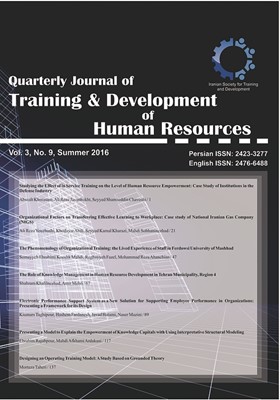-
-
List of Articles
-
Open Access Article
1 - The Impact of Organizational Social Capital on Knowledge Sharing in Media Organizations: Case study in Center of New Media in Islamic Republic of Iran Broadcasting
behrooz ghlichlee amir hatami -
Open Access Article
2 - Promoting Quality of Human Resources Training in Higher Education with Emphasis on Social Capital Development
ebrahim salehi omran -
Open Access Article
3 - Exploring the Positive and Negative Roles of Mentoring on Improving Knowledge Sharing: Barriers and Solutions
Aryan gholipour seyed Javad Mousavi Mohammad hashemi -
Open Access Article
4 - Validation for Faculty Member Development Model in Universities of Tehran
yousef mohebzadegan Mohammad -
Open Access Article
5 - Explaining and Presenting Superintendent Competency Model for Iran’s General Inspection Office: with Grounded Theory Approach
Manijeh Ahmadi Ali Delaware -
Open Access Article
6 - Recognizing the Effective Factors Affecting Human Resource Development (Case study: A Single Provincial Agency SID)
-
Open Access Article
7 - Studying the Effect of Training on Human Resources Strategies with Emphasis on Intermediary Role of Professional Development and Knowledge Sharing
-
The rights to this website are owned by the Raimag Press Management System.
Copyright © 2017-2026







